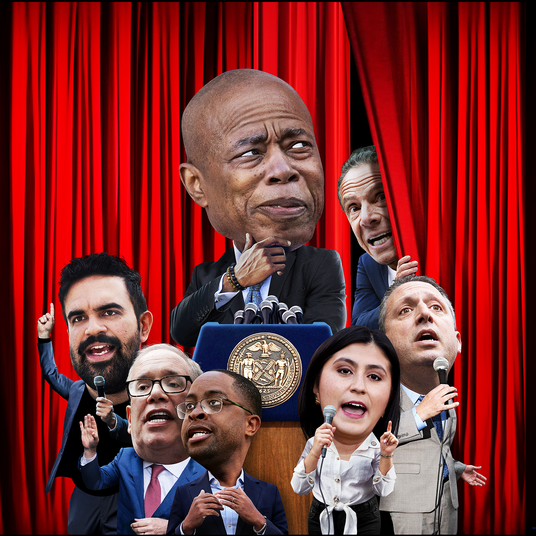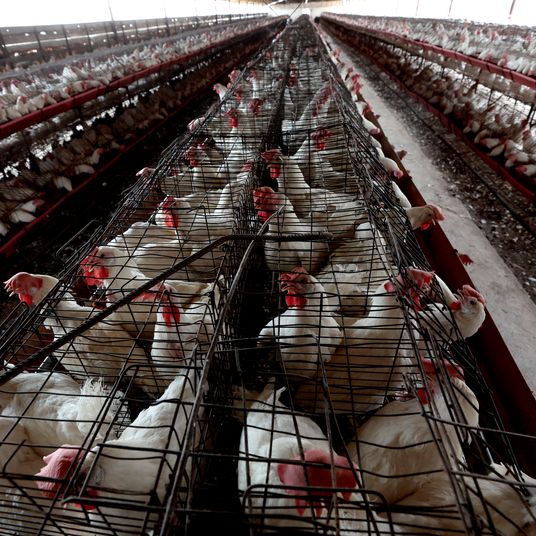
On November 19, 2020, Georgia Republicans suffered a major blow when their state was called for Joe Biden in a close presidential contest. But at that point, they had every reason to think the future would be brighter. They were the strong early favorites in two January U.S. Senate runoffs. And knowing that Democrats controlled the White House, Republicans could look forward to likely gains in 2022 for three reasons: (1) The presidential “out” party usually gets a boost in midterms, (2) midterm turnout patterns usually favor Republican voting groups, relatively speaking, and (3) redistricting would be totally in the GOP’s hands thanks to their control of the governorship and the legislature.
But instead of playing their shot as it lay, Georgia Republicans tore each other apart over Donald Trump’s mendacious election “fraud” claims and his subsequent efforts to overturn the Biden victory, with many GOP elected officials and activists gleefully attacking Secretary of State Brad Raffensperger and Governor Brian Kemp, both Republicans, for certifying Biden’s victory. Trump himself dominated the Senate runoffs and may well have depressed Republican turnout by constantly claiming that the vote in Georgia was “rigged.”
After the catastrophe of losing control of the Senate for their party, which in turn led to the passage of Biden’s $1.9 trillion stimulus package, Georgia Republicans probably should have licked their wounds and begun healing their divisions heading toward 2022. But no — instead, they made the Georgia General Assembly the national showcase for GOP voter-suppression measures. There was hardly an evil idea for making voting more difficult, particularly for minority citizens, that did not get introduced by some Republican legislator during its 2021 session, up to and including a total end to no-excuse voting by mail, a ban on Sunday in-person early voting, all sorts of burdensome and redundant voter-ID requirements, and attacks on the jurisdiction of Democratic county election offices. The nastiness progressed to include the cartoon-villain idea of making it a crime to give food and water to voters in the long lines that Black people notoriously have to endure in Georgia.
All this obnoxious activity was obviously the product of Trump’s election-fraud claims, since there were no documented cases of problems with Georgia’s 2020 elections other than the aforementioned long lines. So the Georgia GOP was very conspicuously exposing itself as doing bad things in a bad cause.
Eventually, legislators took out some of the most offensive pieces of the final election bill, but they had so mishandled it all that nobody noticed or cared. As Kemp went on-camera to spin the legislation he was about to sign as a triumph for voting rights and election security, a Black legislator tapped on his door to see what he was doing and was promptly wrestled out of the Georgia State Capitol by white state troopers and charged with two felonies:
Surely, someone in the orbit of Kemp or legislative leaders could have advised them to tell the troopers protecting them, “Whatever you do, don’t go all Bull Connor on protesters!” Instead, the image of Park Cannon being dragged off to jail was the enduring impression of the day — and brought back a lot of bad memories, especially for Black citizens subjected to generations of brutal suppression of both voting rights and the right to peacefully protest.
And when the national protests over the law pressured major Atlanta-based corporations to deplore the law, did Republicans ignore the criticism? No. They threatened to withdraw a tax subsidy to Delta Air Lines (though they did not follow through on the threat). And in a particularly juvenile bit of theater, the House Speaker made sure cameras saw him cracking open a can of Pepsi at a press conference in what was clearly an expression of unhappiness with local corporate giant Coca-Cola. Even if this anti-corporate saber-rattling isn’t serious, alienating their usual business allies is not a smart move for Republicans heading into an election cycle that has now gotten a lot tougher.
Nobody really knows what sort of advantage the new election law will give Georgia Republicans going forward. But it may not be enough to counteract the voter mobilization that Democrats and voting-rights advocates will undertake in defiance of GOP efforts to make it harder for them to register and vote, particularly if voting-rights champion Stacey Abrams is, as expected, at the top of the Democratic ticket in 2022 (alongside Senator Raphael Warnock, heir to the pulpit once held by Martin Luther King Jr.).
The brutal stupidity of his party’s recent maneuvers led Lieutenant Governor Geoff Duncan to pen an op-ed for USA Today that defended some of the actual provisions of the new law while expressing impatience with others, and with the underlying GOP lies about “voter fraud”:
Last week’s divisive debate on election reform directly resulted from the months-long misinformation campaign led by former President Donald J. Trump …
Republicans in politically safe districts [should have] resist[ed] the temptation to superficially support knee-jerk reaction legislation, such as not allowing the distribution of water within 150 feet of a polling station or punishing and removing oversight responsibilities from the former president’s scapegoat and popularly-elected statewide official Secretary of State Brad Raffensperger, just to appease the extreme right corners of their districts and to avoid potential primary challenges.
Unfortunately, Republicans fell into the trap set by the left and allowed them to make the bill into something that it’s not.
Like Raffensperger and Kemp, however, Duncan was already the almost certain target of a Trump 2022 primary purge effort, likely fronted by State Senator Burt Jones, a prominent supporter of Trump’s lies about 2020. It would not be at all surprising to see the 45th president himself in the Peach State pursuing vengeance against “disloyal” Republicans and perhaps reprising his disastrous role in the Senate-runoff campaign.
If only they had quietly conceded after November, then Republicans might still have those two Senate seats from Georgia and control of the Senate itself. And had Georgia Republicans gone about their usual business of passing bad — not conspicuously racist — legislation this year, they might be in very good shape for the midterms. As it is, if they suffer another debacle in 2022, they have no one but themselves, and perhaps the tyrant of Mar-a-Lago, to blame.






























